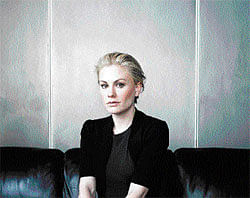
Recently, on a soundstage representing a New Age shop in Louisiana, US, another sign warned ‘Live panthers on set,’ but those terrifying predators were nowhere to be seen.
Instead, Sookie Stackhouse, the mind-reading, vampire-attracting waitress portrayed by Anna Paquin, and her friends Tara (Rutina Wesley) and Lafayette (Nelsan Ellis) were cowering in fear of a sinister Wiccan, played by Fiona Shaw, who appeared to be carrying on a conversation with herself — or maybe with someone else inside her.
When Paquin visited behind the cameras during a shooting break and sprawled herself across a director’s chair, she playfully declined to explain what exactly had transpired in this scene from the next-to-last episode of the coming True Blood season. “Would you want to know what’s in store?” she asked. “There’s something about anticipation that makes it more exciting.”
And what is True Blood, which will have its fourth season premiere on HBO, if not a joyously macabre exercise in gratification so long-delayed it sometimes exceeds your lifespan?
What began as the tale of a virginal Louisiana blonde infatuated with an un-dead hunk has evolved into a saga of natural and supernatural desire, where vampires yearn for fairies; men who turn into dogs lust for women who turn into horses; and the Freudian underpinnings of a stake through the heart have never been more vivid.
While True Blood has grown into an increasingly popular and crucial part of HBO’s lineup, its centre has always been Paquin’s performance as Sookie, a beacon of curious, increasingly cynical humanity in a world of werewolves, witches and thousand-year-old beefcake.
As the series has chronicled Sookie’s passage from innocence to experience, it has provided a parallel journey for Paquin, on which her maturation as an actor has come with unforeseen benefits. Comparing herself to her character, Paquin, 28, said: “She doesn’t know just how big what she’s getting herself into is, so she proceeds with full-force Sookie energy.
That’s something she and I have in common — completely different circumstances. If I’d known what I was getting myself into, would I have charged full-steam ahead? Who knows. I love where I am now.”
When she was presented with the True Blood pilot script, adapted by Alan Ball from Charlaine Harris’s first Southern Vampire Mysteries novel, she was looking for a metaphoric change of scenery. She had a reputation as an accomplished, preternaturally professional actress — winning an Academy Award at the age of 11, as Paquin did for The Piano — but sought something different.
“There’s a difference,” Paquin said, “and then there’s almost, like, multiple-personality, full-on ‘Invasion of the Body Snatchers,’ who the hell is that person? Sookie is about as radically different from me and a lot of the work I’ve previously done as you could possibly come up with.”
Ball, the Oscar-winning screenwriter of American Beauty and Emmy-winning creator of Six Feet Under, said that when he learned Paquin was interested in True Blood, his reaction was: “Really? That doesn’t — huh. She wants to do this?” He added: “At the time Anna was dark haired, and certainly her body of work didn’t lead me anywhere near Sookie Stackhouse.”
Paquin, whose eclectic resume also includes Almost Famous, She’s All That and three X-Men movies, said she expected to be told: “She’s just not blonde enough as a person. Which, by the way, apparently is a thing which I have heard before.” But with some tenacity, a few auditions and the help of a celebrity colourist, the role was soon hers.
True Blood had its premiere on HBO in US in 2008, and in its first season went from about 1.4 million viewers for its debut to almost 2.5 million for its season finale; it now draws about 5 million viewers for new episodes.
Those numbers — stronger than those drawn by a critical darling like Mad Men, not so huge a phenomena like The Walking Dead or Jersey Shore — point to True Blood as a show that has built its audience through positive word of mouth and, perhaps, the curiosity stoked by a provocative Rolling Stone magazine cover. It has taken a little longer for its critical reputation to catch up. True Blood received its first Emmy nomination for outstanding drama only last year.
Harris, whose novels serve as loose inspiration for each True Blood season, said that while Paquin did not quite fit her mental portrait of the character — no one could — she had learned things about Sookie from her performance. “Anna’s Sookie has always been somewhat angrier than the Sookie 1 wrote,” Harris said in a telephone interview from Arkansas, where she lives. “So that leaves me wondering if I wrote her angrier than I realised, or if that’s a younger person interpreting my words in a way that makes more sense to them.”
Though the time when she can still be regarded as a youthful phenomenon is running out, Paquin seemed glad to be relieved of that burden and had perhaps gained perspective from working with co-stars who are essentially immortal.
“I feel like my numeric age is starting to catch up with my life experience,” she said. “For most of my life I’ve worked with and been around adults. I still feel like 30’s incredibly young.”